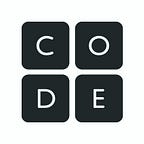Could time spent learning to code also help students improve at reading, math, and science? Throughout the growth of Code.org, this has been a question we’ve been asked. There’s no doubt that computer science exercises students’ analytical, problem-solving, and critical thinking skills. These skills can be helpful beyond just coding and computer science, throughout life. And in education, critical thinking skills are useful in all subjects.
Meanwhile, educators struggle with too many priorities. “If we teach computer science, what should we cut?” is a regular question. A related concern is “Our students already struggle enough with basic reading and math.” But what if learning coding and computer science helped students improve at other subjects? This is an important research question. There is no definitive answer yet, but the early signs are positive. A few years ago, a study by the College Board determined that learning computer science in high school may be linked to improved learning in math.
And today, there is new evidence to support this idea.
Research conducted with 3rd — 5th-grade students in Broward County found that students who did extra Code.org CS Fundamentals activities, in classrooms of teachers who reported high levels of resourcefulness, had significantly higher scores on the Achieve3000 reading comprehension exam. But that’s not all. They scored significantly higher on Florida State Math, Science, and English Language Arts Exams too!
This is great news for the hundreds of thousands of teachers who are teaching CS Fundamentals, and we hope more teachers join them. It’s also one of the first studies showing an association between studying computer science and higher student achievement on standardized tests, which is important for advocates of computer science everywhere.
Making time for computer science in Broward County Public Schools
Time4CS is an NSF-funded project conducted in Broward County Public Schools that seeks to bring more computer science to 3rd-5th-grade students by integrating CS activities into problem-based learning modules. Research conducted by Outlier Research & Evaluation at the University of Chicago investigated effects of these modules on students’ attitudes toward computer science and their academic achievement.
The full research report about the Time4CS project has not yet been published and will contain a complete analysis of the whole project. Code.org activities were one part of the implementation analysis, and Outlier was kind enough to make a preliminary findings report that summarized these particular findings.
Students of teachers who reported being resourceful and innovative performed better
As part of the study, Outlier measured characteristics of the teachers who participated in the study including resourcefulness (e.g., “When planning for my work, I prepare for potential challenges”) and innovativeness (e.g., “I experiment with new practices all the time”). It turns out that teacher innovativeness was directly related to student outcomes, and teacher resourcefulness, while not directly related, still played a role.
Doing extra Code.org CS Fundamentals activities matters
Code.org CS Fundamentals courses were a major component of the modules the teachers used. Each grade was assigned one CS Fundamentals course that was grade-level appropriate, but some teachers did extra Code.org CS Fundamentals activities with their students — this meant having students complete lessons from one of the other CS Fundamentals courses. It turns out that doing these extra coding activities was one of the key ingredients for improved student performance.
Extra Code.org activities + resourceful teachers = higher student achievement!
Outlier examined relationships between completing extra Code.org activities and student outcomes, also looking at whether certain classroom conditions (e.g., resourceful teachers) made a difference. Outlier found associations between extra Code.org activities and higher student outcomes on all of the standardized tests they examined when teachers reported higher levels of resourcefulness!
Broadly speaking, more was better — completing more extra Code.org activities combined with more teacher resourcefulness was associated with higher scores on Florida State math, science, and English Language Arts standardized tests. Interestingly, just doing extra Code.org activities or just being a resourceful teacher didn’t show the same association. Carry them out in the same classroom and see the difference — how cool!
To read more about the study and how these analyses were done check out the Preliminary Findings Report provided by Outlier.
What next?
Results like this raise a number of new and exciting questions to investigate. At this point, we know that completing extra Code.org activities in classrooms where the teachers are resourceful is linked to higher student scores on state exams (e.g., literacy). But, we don’t yet know exactly why. For example, what are the true factors of “resourceful” teachers that contribute to improved literacy scores? Why does it have to be extra Code.org activities, and not just the assigned ones? Would any coding activities work, or is there something about the Code.org CS Fundamentals progressions that work particularly well for improving literacy?
Hadi Partovi, Code.org
